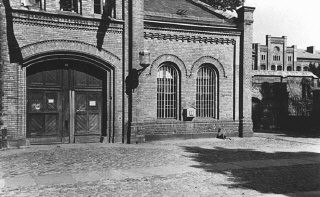Dante
"The Libido for the Ugly"
Wow?!Actually, no, it's not "nuts" at all: you're just ignorant of basic WWII history. If anything is truly nuts, it's your surreal denial that Hitler planned on immediately pulling back his troops from the Rhineland if France responded forcefully and that France could have crushed Hitler's army at that point. In all my years of discussing WWII, you're the first person who has ever disputed these well-known, well-documented facts.
And instead of admitting your astonishing ignorance, you deflect and evade and pretend you did not horrendously blunder.
So this is your dishonest, juvenile answer to having your amazing ignorance exposed? Let's take your doubling-down nonsense point by point:
the aggressive Nazi drive was not going to be checked for long.
LOL! Sheesh! Again, France could have crushed the German army in 1936. Nobody but you denies this. The quotes I provided earlier on this point are only a few of the tens of thousands that could be provided. Virtually every book ever written about WWII notes this fact.
And it is a matter of record that Hitler was quite scared that France would react forcefully to the Rhineland incursion, and that Hitler needed repeated reassurance and coaxing from Neurath to keep him from withdrawing the troops after he heard an unconfirmed report that French troops had entered Germany. Find me a scholarly discussion on the Rhineland incursion that does not mention these well-known facts. I dare you.
you're all over the place Mister Peabdoy. France was incapable of acting.
Read: More of your juvenile ducking and dodging, and another amazing gaffe.
France was "incapable" of acting??? You must be kidding. As I've documented, France's army at the time was far more powerful than Germany's army. Scholars universally recognize that France could have crushed Hitler at that point. Find me one scholar who says otherwise.
The problem was not that France could not act but that France's leadership was spineless and committed to a fatal policy of appeasement. It's amazing that I even have to explain this stuff to you. Again, this is WWII History 101 material.
Shirer? okie dokie
LOL! Uh, yes, Shirer. FYI, Shirer wrote one of the most highly acclaimed, best-selling books on the rise and fall of Nazi Germany ever written. So, yeah, Shirer.
Are you ever going to deign to share with us your sources for your silly, fringe revisionism? I mean, who are you, anyway? You comically describe yourself as a know-it-all, refer to yourself in the third person, and say "Dante has forgotten more about this subject than you've ever learned," and then you post utterly erroneous comments about basic facts that nobody but you denies.
Hitler was not going to fall in 1936. And this is all after the war. BS fed to the allies. It's all looking back BS.
This is clown material. Given your obvious ignorance of serious historical scholarship, you're in no position to be issuing such sweeping--not to mention laughably erroneous--pronouncements. We both know that you can't cite a single reputable scholarly source to back up your bizarre version of WWII history.
Yes, Hitler could have fallen in 1936 if France had responded forcefully and crushed Hitler's army after the Rhineland incursion began. You're the only one who says otherwise. (Well, actually, a few fringe, neo-Nazi writers likewise claim that Hitler was in no danger of falling in 1936. Congratulations.)
No, this was not "all after the war BS fed to the allies." What a comical, absurd comment. Do you have any idea who those generals were who provided some of this information? Do you? Are you aware that some of them made those comments when they did not know they were being recorded and were speaking among colleagues? Many of them despised Hitler and made those comments only to lament the chances that were missed to depose Hitler.
Mister Peabody. You sure do invent lots of things.

